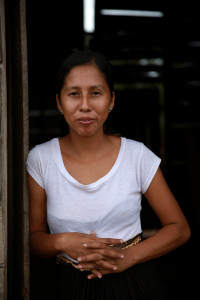Isabel lives in a small wooden house on a muddy dirt road in Dos de Junio, a small village in northern Bolivia. The gaps between the irregularly cut boards that form the house’s exterior walls provide a bit of ventilation to the otherwise windowless dwelling, but also give free reign to the mosquitos, especially when her children go to bed at night. It’s a one-room house with a dirt floor, two beds, a small cupboard to store belongings, and a stack of pots and pans sit in another corner. There’s a deep well in the back yard where Isabel gets her water. This has been home for the last five years.

Isabel Justiniano Ramirez
Isabel is a nurse. She is 25 years old, and lives with her two children Angel (6) and Luz (3). She used to live with her abusive mother a few miles away in Riberalta where she still works. Five years ago, she left the town to build a house at the far edge of this community when the government was giving away plots of land.
But here in Dos de Junio, there is no electricity, and her life is a different kind of struggle. As a healthcare worker, she is well aware of the health risks her neighbors face living without electricity. With the spreading Zika virus constantly in her thoughts, Isabel listens to her children crying from mosquito bites at night. When she can, she brings home medicine from the hospital to help treat ailments in her community. Salmonella is rampant, she says, because clean water isn’t readily available.
She wishes there were electricity because giving injections by candlelight is more than a challenge. It is risky. If the community had streetlights, motorbike taxis could avoid bumps on the road when taking the sick to hospitals.
About 1.1 billion people in the world live without electricity, disproportionately hurting women and children more than any other group. Females are half of the global population, but nearly 75 percent live in energy poverty. For now, Isabel is one of these women.
Later this year, a dozen linemen from electric co-ops in Missouri and Oklahoma will make the long trek to Isabel’s village. Working with the local electric co-op Cooperativa Electrica Riberalta, they will build and upgrade power lines, and bring electricity for the first time to Isabel and her neighbors.
Until electricity comes to her community, her life will continue the way it is. We look forward to telling Isabel’s story — a brighter story, after our volunteers turn on the lights and recharge hope.